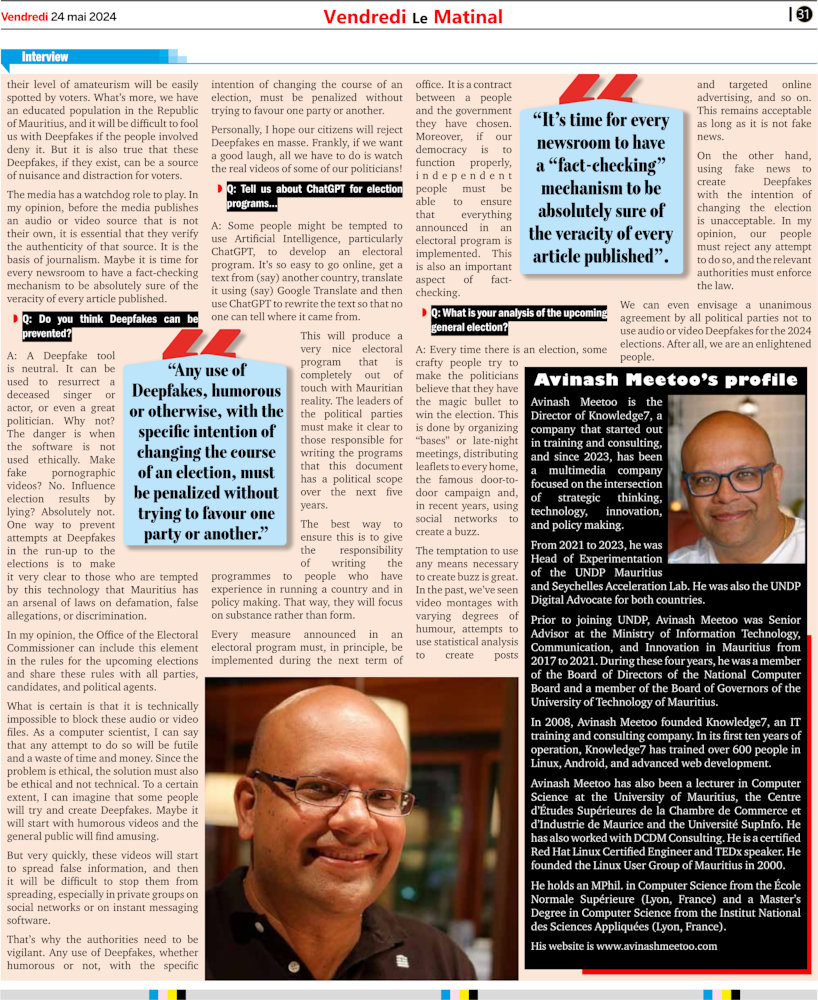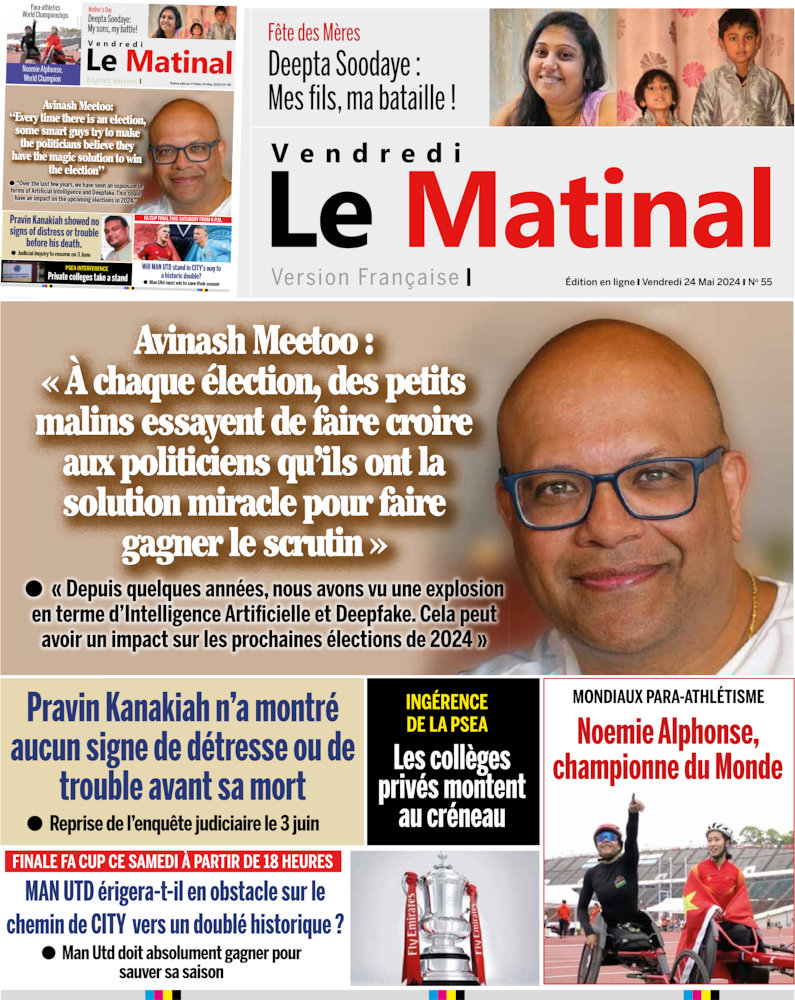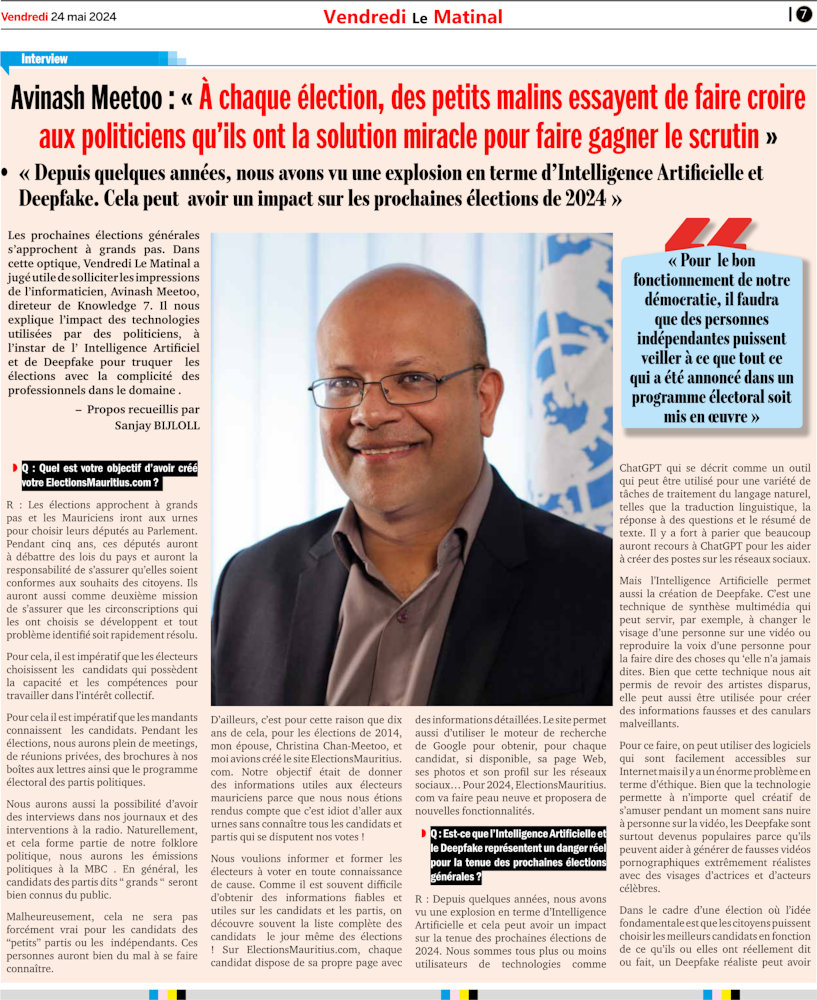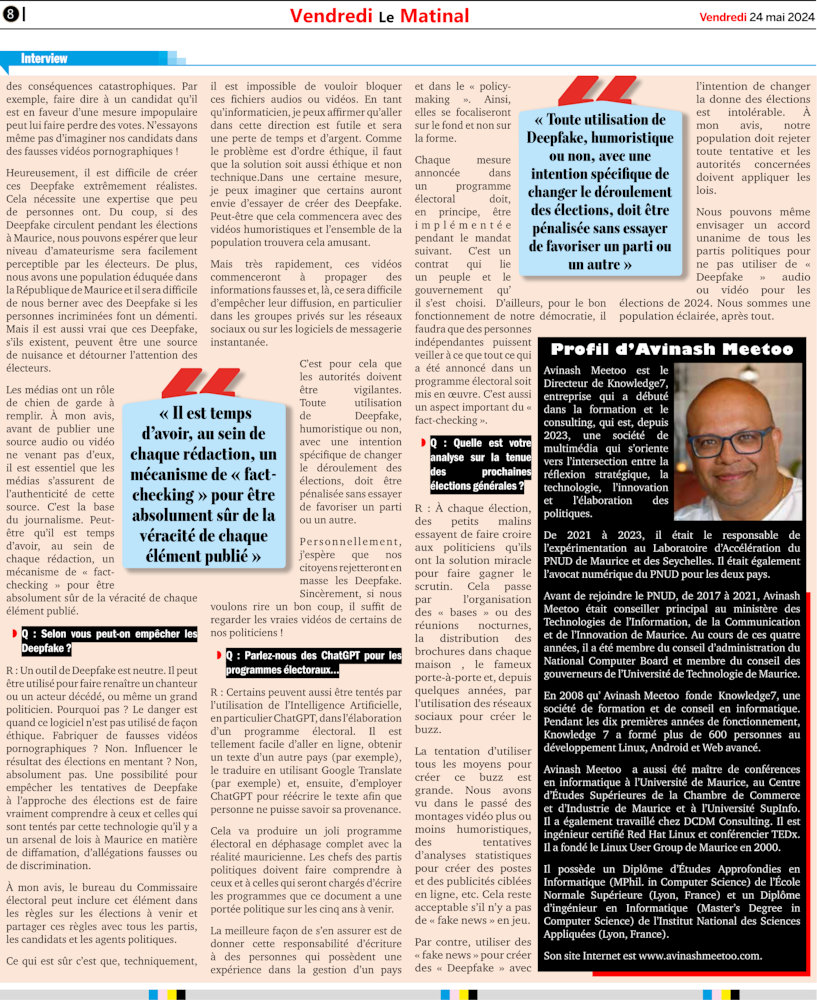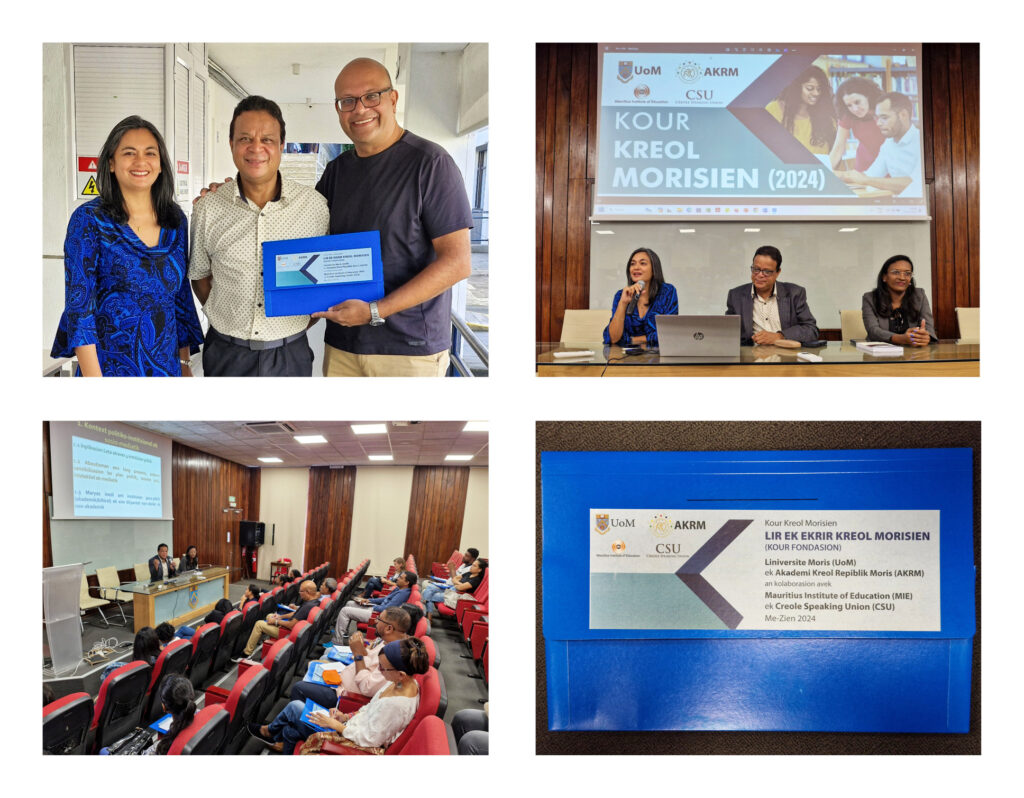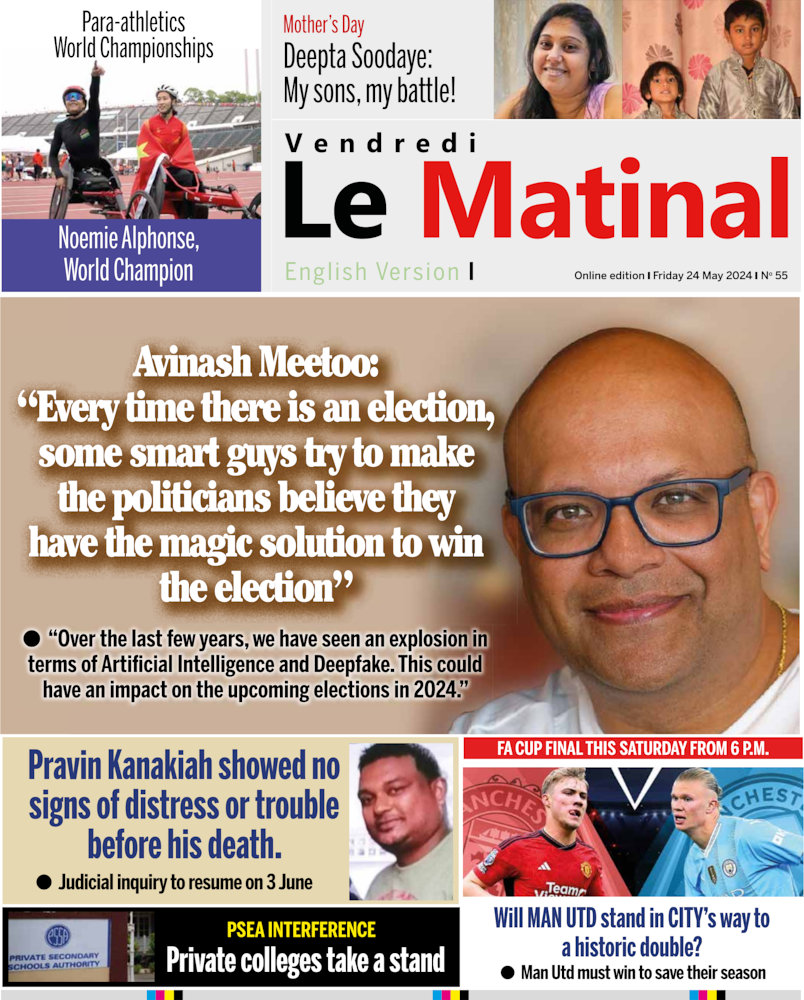
This is my interview in Le Matinal of 24 May 2024. Interview by Sanjay BIJLOLL.
The next general election is fast approaching. With this in mind, Vendredi Le Matinal thought it would be useful to hear the views of Avinash Meetoo, a computer scientist and the director of Knowledge7. He explains the impact of technologies used by politicians, such as Artificial Intelligence and Deepfake, to rig elections with the complicity of professionals in the field.
What is your objective in creating ElectionsMauritius.com?
The election is fast approaching, and Mauritians will go to the polls to choose their members of Parliament.
For five years, these MPs will debate the laws of the country, and will be responsible for ensuring that they are in line with the wishes of the people. Their second mission will be to ensure that the constituencies that chose them develop, and that any problems identified are quickly resolved.
To achieve this, it is imperative that voters choose candidates who have the ability and skills to work in the collective interest.
To achieve this, it is imperative that the voters get to know the candidates. During the election campaign, there will be many rallies, private meetings, leaflets in our mailboxes and the electoral programs of the political parties.
We will also be able to do interviews in our newspapers and on the radio. Of course, and this is a part of our political folklore, we will have political broadcasts on MBC. In general, the candidates of the so-called “big” parties will be well known to the public.
Unfortunately, this will not necessarily be true for candidates from the “smaller” parties or independents. These people will find it difficult to make themselves known.
This is why, ten years ago, for the 2014 elections, my wife, Christina Chan-Meetoo, and I created the website ElectionsMauritius.com. Our aim was to provide useful information to Mauritian voters because we realized that it’s silly to go to the polls without knowing all the candidates and parties vying for our votes!
Our aim was to inform and educate voters so that they could cast an informed vote. As it is often difficult to obtain reliable and useful information about candidates and parties, we often discover the complete list of candidates on election day itself! On ElectionsMauritius.com, each candidate has his or her own page with detailed information. The site also allows you to use Google’s search engine to find, for each candidate, his or her web page, photos, and profile on social networks, if available… For 2024, ElectionsMauritius.com will get a facelift and will offer new features.
Do Artificial Intelligence and Deepfake pose a real threat to the next general election?
We have seen an explosion in Artificial Intelligence over the last few years, and this could have an impact on the next election in 2024. We are all more or less using technologies such as ChatGPT, which describes itself as a tool that can be used for a variety of natural language processing tasks, such as language translation, answering questions and summarizing text. It’s a safe bet that many will use ChatGPT to help them write posts on social networks.
But Artificial Intelligence can also be used to create Deepfakes. This is a multimedia synthesis technique that can be used, for example, to change a person’s face in a video or reproduce a person’s voice to make them say things they’ve never said before. Although this technique has allowed us to see dead artists again, it can also be the source of false information and malicious hoaxes.
This can be done using software readily available on the Internet, but there is a huge ethical problem. Although the technology allows any creative person to have fun for a while without harming anyone in the video, Deepfake has become particularly popular because it can be used to create extremely realistic fake porn videos with the faces of famous actresses and actors.
In an election, where the fundamental idea is that citizens should be able to choose the best candidates based on what they have actually said or done, a realistic Deepfake can have disastrous consequences. For example, getting a candidate to say he or she is in favour of an unpopular measure could cost them votes. Let’s not even try to imagine our candidates in fake porn videos!
Fortunately, creating these extremely realistic Deepfakes is difficult. It requires expertise that few people have. So, if Deepfakes are circulated during the Mauritian elections, we can hope that their level of amateurism will be easily spotted by voters. What’s more, we have an educated population in the Republic of Mauritius, and it will be difficult to fool us with Deepfakes if the people involved deny it. But it is also true that these Deepfakes, if they exist, can be a source of nuisance and distraction for voters.
The media has a watchdog role to play. In my opinion, before the media publishes an audio or video source that is not their own, it is essential that they verify the authenticity of that source. It is the basis of journalism. Maybe it is time for every newsroom to have a fact-checking mechanism to be absolutely sure of the veracity of every article published.
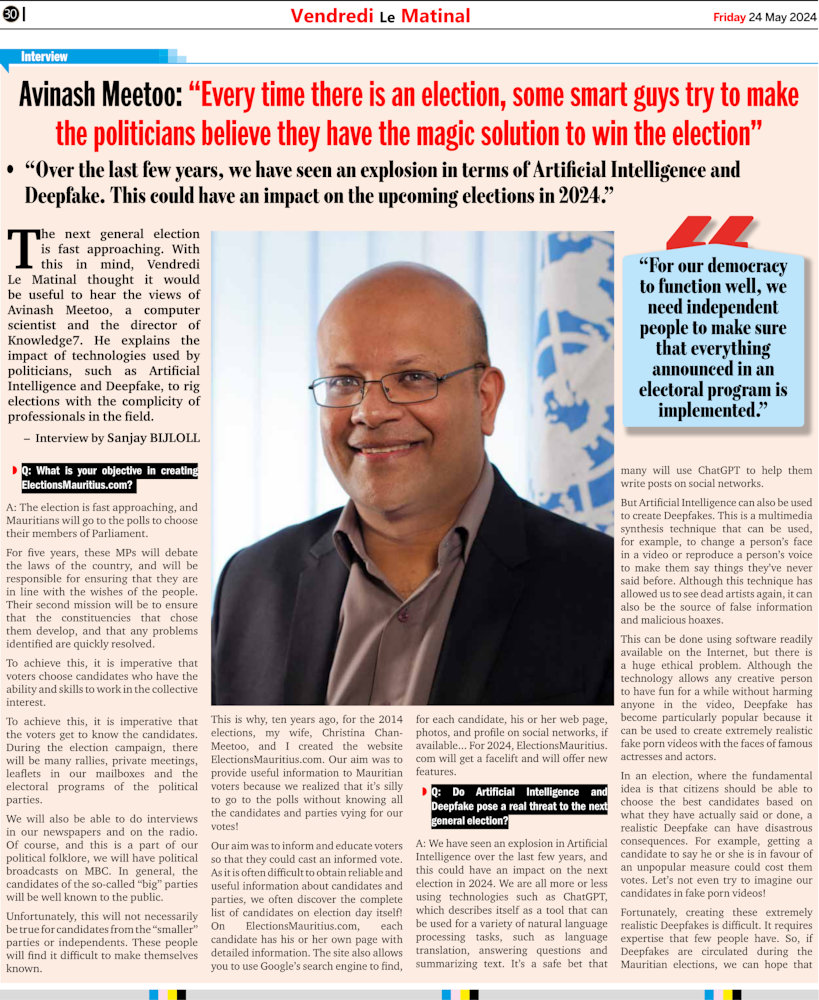
Do you think Deepfakes can be prevented?
A Deepfake tool is neutral. It can be used to resurrect a deceased singer or actor, or even a great politician. Why not? The danger is when the software is not used ethically. Make fake pornographic videos? No. Influence election results by lying? Absolutely not. One way to prevent attempts at Deepfakes in the run-up to the elections is to make it very clear to those who are tempted by this technology that Mauritius has an arsenal of laws on defamation, false allegations, or discrimination.
In my opinion, the Office of the Electoral Commissioner can include this element in the rules for the upcoming elections and share these rules with all parties, candidates, and political agents.
What is certain is that it is technically impossible to block these audio or video files. As a computer scientist, I can say that any attempt to do so will be futile and a waste of time and money. Since the problem is ethical, the solution must also be ethical and not technical. To a certain extent, I can imagine that some people will try and create Deepfakes. Maybe it will start with humorous videos and the general public will find amusing.
But very quickly, these videos will start to spread false information, and then it will be difficult to stop them from spreading, especially in private groups on social networks or on instant messaging software.
That’s why the authorities need to be vigilant. Any use of Deepfakes, whether humorous or not, with the specific intention of changing the course of an election, must be penalized without trying to favour one party or another.
Personally, I hope our citizens will reject Deepfakes en masse. Frankly, if we want a good laugh, all we have to do is watch the real videos of some of our politicians!
Tell us about ChatGPT for election programs…
Some people might be tempted to use Artificial Intelligence, particularly ChatGPT, to develop an electoral program. It’s so easy to go online, get a text from (say) another country, translate it using (say) Google Translate and then use ChatGPT to rewrite the text so that no one can tell where it came from.
This will produce a very nice electoral program that is completely out of touch with Mauritian reality. The leaders of the political parties must make it clear to those responsible for writing the programs that this document has a political scope over the next five years.
The best way to ensure this is to give the responsibility of writing the programmes to people who have experience in running a country and in policy making. That way, they will focus on substance rather than form.
Every measure announced in an electoral program must, in principle, be implemented during the next term of office. It is a contract between a people and the government they have chosen. Moreover, if our democracy is to function properly, independent people must be able to ensure that everything announced in an electoral program is implemented. This is also an important aspect of fact- checking.
What is your analysis of the upcoming general election?
Every time there is an election, some crafty people try to make the politicians believe that they have the magic bullet to win the election. This is done by organizing “bases” or late-night meetings, distributing leaflets to every home, the famous door-to- door campaign and, in recent years, using social networks to create a buzz.
The temptation to use any means necessary to create buzz is great. In the past, we’ve seen video montages with varying degrees of humour, attempts to use statistical analysis to create posts and targeted online advertising, and so on. This remains acceptable as long as it is not fake news.
On the other hand, using fake news to create Deepfakes with the intention of changing the election is unacceptable. In my opinion, our people must reject any attempt to do so, and the relevant authorities must enforce the law.
We can even envisage a unanimous agreement by all political parties not to use audio or video Deepfakes for the 2024 elections. After all, we are an enlightened people.
